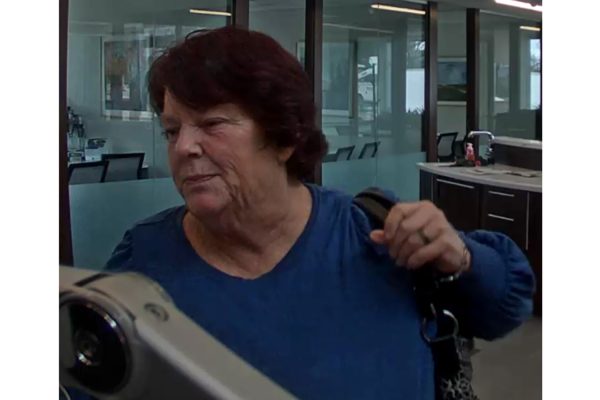Judge denies acquittal request of former Iowa Hillel House director in sexual abuse trial
The alleged victim, who is a minor, and his mother testified about David Weltman’s behavior and actions towards the minor during Hebrew lessons and an Israel trip.
David Weltman stands as the jury enters the courtroom during his trial at the Johnson County Courthouse in Iowa City, Iowa, on Wednesday, March 4, 2020. Weltman is accused of sexually abusing a then 9-year-old boy during a Hebrew lesson at Iowa Hillel, where Weltman was the director of the student Jewish organization. (Pool Photo, Jim Slosiarek/The Gazette)
March 4, 2020
After testimony ended Wednesday in the trial of David Weltman — the former Iowa Hillel House director accused of sexual abuse — a district judge denied a request by defense attorney Christopher Foster to acquit Weltman of the charge against him.
Foster argued that there was not sufficient evidence to submit to a jury that a sex act occurred following the testimony. In denying the motion, 6th District Court Judge Chad Kepros said he felt the evidence could persuade a jury that Weltman is guilty beyond reasonable doubt.
Weltman, 29, of Skokie, Illinois, was charged Aug. 29 with second-degree sexual abuse and has since pleaded not guilty. He is accused of sexually abusing a 9-year-old boy during Hebrew lessons sometime in February or March 2019.
Witnesses called by the state testified as to what happened during the alleged incidents — including testimony from the alleged victim, who was nine years old at the time.
The minor — who will not be identified to protect his privacy — testified that Weltman played games during Hebrew lessons. During the “placement game,” Weltman would pick up one student and put them in a different location so the other student could give the name of the location in Hebrew.
“There was a lot of physicality, like roughhousing,” the alleged victim’s mother testified about the lessons. “…The boys were having fun, so I didn’t think anything of it.”
During a placement game last year, the alleged victim said Weltman picked him up, took him to another room, and put his hands under his pants and underwear. He did not tell anyone about the incident immediately, he said.
RELATED: Jury selection marks first day of Weltman trial
“I thought it was an accident,” the alleged victim testified, adding during cross examination that Weltman only touched him for a second.
A few months prior to the incident, Weltman and the mother of the alleged victim — who were family friends — found out they were coincidentally going to Israel in March 2019, the mother said. She was planning the trip as a bat mitzvah gift for another one of her children and not planning to take the alleged victim.
Weltman suggested that the minor come on the trip so Weltman could teach him Hebrew in a place where the language is spoken. Once the alleged victim became more interested in learning Hebrew, his mother testified, it was agreed that the minor would go on the trip.
Weltman offered a detailed itinerary of the trip and switched plane tickets so he could travel with the family, the minor’s mother said. Once Weltman began suggesting the minor sleep in the same room as Weltman instead of with his family, she said she became uncomfortable. Weltman told her that “he was not angry, but he was irritated” about the change of plans, she said.
The minor stayed alone with Weltman one night when the family decided to go to Be’er Sheva, a city in Israel, with Weltman, the mother said. Weltman made the sleeping arrangements and said there was no way for the minor to stay with his family. The alleged victim testified that he felt uncomfortable staying with Weltman instead of his mother.
During the night, Weltman told the minor to take a shower and turned the shower on for him. Weltman came into the bathroom to see if there was a towel on the other side of the shower, the alleged victim said, and he saw Weltman look at him while in the shower.
When it was later suggested that the family stay another night in Be’er Sheva, the mother said her son had a “full-on, frantic panic attack. He was yelling, he was screaming. … He was kicking at me.”
She added that the minor didn’t usually act in this manner and was often “distraught” for the rest of the trip.
At one point during the trip, the alleged victim said, Weltman put him on his lap and refused to let go during a game.
“I didn’t like it, and I was trying to get off of his lap,” the minor said, asserting that he also was yelling and crying at the time.
RELATED: Former Iowa Hillel director’s trial for sex-abuse charges slated to start next week
His mother said that she was in the shower when this game was being played, and she found her son crying in a bedroom when she finished showering. He had barricaded the door with a bed while Weltman sat in the living room.
The minor said he told his mother about the shower incident after coming back to the U.S., and he told her about the incident during Hebrew lessons a few days later. The shower incident in Israel made the minor believe that the Hillel House incident wasn’t an accident.
Another witness, Iowa City psychologist John Meidlinger, spoke generally on the behaviors of perpetrators and children in situations where a perpetrator “grooms” a child into a physical relationship. He does not know the alleged victim or any facts about the case besides the charges filed.
In “grooming” situations, Meidlinger said, a perpetrator will see how much a child likes him or her and sees how comfortable a child is with being touched. These perpetrators will also try to obtain the trust of the child’s family and other community members, he said, so that he or she is seen as a “good person” by everyone.
Children may delay reporting any type of inappropriate behavior, Meidlinger said, because they’re confused about what has occured. It can be even more confusing when the child knows the perpetrator, he said, because a child may not want to get them in trouble or is scared of getting in trouble themselves.
“They also don’t understand the experience. They don’t know how to cope,” he said. “… Eventually, hopefully they will [report] if they get pushed on it enough or it becomes intolerable.”
The trial will continue at 9 a.m. Thursday with witnesses called by the defense.













